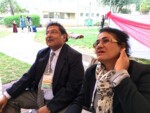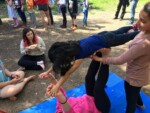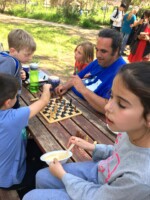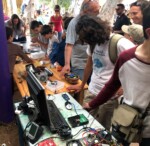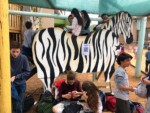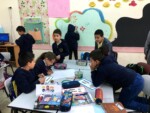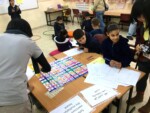Kinma School in Australia Seeks An Enthusiastic Teacher
Kinma
We seek a curious and enthusiastic learner who thrives, and is BOSTES qualified, in teaching Primary aged children in NSW, Australia. We are a school community called Kinma on Sydney 's Northern Beaches. You will find us on 5 acres of bushland; an integral part of our students' learning.
Our school philosophy centres around genuinely involving children and their families in education. Our staff employ a progressive practice and optimally, we seek a teacher with experience in and/ or a great passion for such learning practices, including, collaborative, creative and critical thinking fused curriculum as well as inquiry based methods.
If you have an interest in exploring our learning/teaching environment, check out the website www.kinma.nsw.edu.au and consider submitting the application (link on opening page) to the School Manager at admin@kinma.nsw.edu.au. Phone inquiries can be made Monday – Friday 8-4. The successful teacher will be offered, in the first instance, a one year maternity leave position.
The Arthur Morgan School is Seeking a House Parent/Teacher
House Parent/Teacher Job Description
Description of school: The Arthur Morgan School is a small, alternative boarding and day school for 27 boys and girls in grades 7-9. Our 100 acre campus, located in the Black Mountains of North Carolina, consists mainly of woods and meadows, with creeks and a pond; it is surrounded by National Forest. The school fosters a loving, energetic living/learning community dedicated to supporting individuality while teaching group cooperation. A balance is sought between academics, outdoor activities, and meaningful work. Experiential learning and responsible participation in community are emphasized throughout. Boarding students live in homes with two or three staff members, and the entire community actively shares work, study, play, and decision-making.
General Responsibilities: It takes a lot of energy to work here. We have intense work schedules–usually 60 plus hours per week. Our work calendar generally follows a conventional school year calendar, with some additional work required during students' breaks. AMS is staff-run by consensus; we have no director or headmaster. All staff are expected to attend our two weekly staff meetings, two of our four Board Meetings, and to participate in running the school cooperatively. Everyone is also expected to attend our weekly student-run All School Meeting and to participate in work projects with the kids. Most of the staff is also involved in planning and leading backpacking/outdoor trips, our 18 day field trips, and any other special field trips or projects/activities we might plan to do.
House Parenting Responsibilities: Houseparenting is a time-intensive position that involves living in a boarding house with 4 to 5 students, a co-houseparent, and perhaps an intern. Both married couples and single people are considered for houseparenting positions. A healthy, respectful working relationship is key to all house parent pairs. Responsibilities of house parents include: running the household (facilitating student's chores, cooking meals and house work projects), identifying and working on general care of the house and grounds (including yard work, the maintenance of the appearance of the boarding house etc.), managing a house budget with a monthly house allowance, helping students with homework, and having fun with the kids in daily life as well as in special house activities. House parents act in loco parentis–in the place of parents–and fill the role of limit setter and authority figure as well as friend and confidant. The position requires the sharing of one's personal space (one's home) and one's self (being "real''). This usually results in very strong and rewarding relationships between house parents and the students in their homes.
Additional Responsibilities: House parenting is half of a full-time position and is combined with other duties to create a full-time position. These other duties can include: teaching core academic classes (Math, Science, English, Art or Social Studies) or electives (performing or visual arts, outdoor skills, woodworking, sports and games, etc.); participating in ongoing maintenance of the school grounds and buildings; leading sports and games; finances and administration; participation in staff committees; fundraising and grant-writing; cooking and chore supervision. All AMS staff are people with a variety of skills, talents, and interests, and our jobs cover a wide array of responsibilities at the school.
Requirements: You must be committed to alternative education; be interested in learning: enjoy being around teenagers; be able to work cooperatively with other adults; and enjoy a simple lifestyle that includes physical work and outdoor activities. Experience in the position for which you are applying is an asset. Willingness to learn about and work within the consensus process is essential. Flexibility and a sense of humor are also very important. We ask for at least a two year commitment from new staff members, as it takes a year for new staff to become acclimated to our program.
Benefits: AMS offers a progressive compensation package. Staff receive room and most board, excellent health coverage including vision and dental, and various other benefits, as well as a salary of about $15,000.
To Apply: Please send a resume with a cover letter stating why you want to work at AMS, how AMS fits into your on-going interests, and describing any relevant past experience. Call for specific job descriptions, information about openings or with questions. We typically review resumes and letters of interest every few weeks and phone interview several persons chosen from the pool of applicants. After a positive phone interview, we invite applicants to interview in person on our campus for two days and two nights. This visit includes time for both formal and informal interviews with applicants and includes the opportunity for applicants to work with students and staff as we progress through our daily schedule. During this process we are interested in staff and student interactions with and observations of the applicant, and we are interested in the applicant's questions and observations of our program.
Sadie Kneidel
Co-Clerk
Arthur Morgan School
60 AMS Circle
Burnsville NC 28714
(828) 675-5128
IDEC 2017! Pictures From The Conference In Hadera, Israel!
From March 26th through April 5th the AERO team participated in the International Democratic Education Conference in Israel. This was the 5th time the IDEC has been in Israel, where the IDEC started in 1993 with a meeting organized by school founder Yaacov Hecht at the Democratic School of Hadera.
The situation with democratic education in Israel is truly off the charts compared to other countries. There are now thirty public or semi-public democratic schools in Israel. The Democratic School of Hadera, site of the first two days of the conference, now has 500 students in its dramatically reconstructed building site, and will go to 800 next year. There were an estimated 3000 attending on those days, including students, staff members and parents from the other democratic schools around Israel. At an opening ceremony the mayor of Hadera said they plan to construct a 4th democratic school in Hadera with a goal to have 100% of its students in democratic schools. These are schools in which students have a say in the governance of the school and freedom to pursue whatever they are interested in studying.
Famed researcher Sugata Mitra participated in the IDEC throughout the course of the 5 days. He won the TED Prize in 2013 for his "Hole in the Wall Project," in which he placed a computer in a wall of a slum and the students taught themselves to use it, including learning English. He replicated the experiment throughout India with the same results, eventually creating the "School in the Cloud." During the opening session he painted a picture of the world 20 years from now, pointing out that 20 years ago there was no iphone, no Facebook, no Twitter, etc. The point was that, with an accelerated information curve we can hardly imagine that future and certainly don't know how to prepare students for it, except by making sure they are creative self-learners. Mitra keynoted AERO's 2015 conference.
Coincidentally, just as the conference was starting, computer students at the Democratic School of Keshet won a country-wide computer competition against 800 other schools. This was in spite or because of the fact that the school has no computer teacher. The student team taught themselves! This was big national news, featured in many news outlets. Later in the conference the winning team did a workshop with Sugata Mitra about their exploits. They just sent us an exclusive article, written by the students, about their adventure, featured below! .
The attendees at this year's IDEC were from 30 countries! It included many former IDEC organizers such as Kageki Asakura (Japan 2000), Marko Koskinen (Finland 2016), Cecelia Bradley (Australia 2006), Chloe Duff (England 2011), Tae Wook Ha (Korea 2014), Verena Gruner (New Zealand 2015), Ana Yris Guzman Torres (Puerto Rico 2012), Henry Readhead (Summerhill, England 1999). It also included Ramchandra who hopes to host an IDEC in Nepal in 2020. Next year's IDEC will be in India, co-organized by Saumya Sharma-Meier. Remarkably, the IDEC is not an organization. Each year a different school agrees to host the IDEC upon attending at least two IDECs and agreement with the attendees at an IDEC. Yet there have been several spinoffs, such as the European Democratic Education Community and the Asia-Pacific Democratic Education Community. The annual AERO Conference is a direct result of our hosting the IDEC in 2003. Our 14th annual conference will be in New York August 2-6.
A group of attendees went on a two day pre-conference trip, visiting a progressive school in the Arab city of Nazareth and four democratic schools. The last school visited was the Kanaf Sudbury School in the Golan Heights which, incredibly, has just become perhaps the only public Sudbury in the world.
Several years ago, through our school starter course, we helped start the first democratic schools in Poland. This year there was a big group of Polish attendees. There are now 30 democratic schools in Poland!
Most of the attendees from out of the country stayed at Givat Haviva, a kibbutz and learning center dedicated to peace and cooperation between Jews and Arabs. This is where the rest of the IDEC took place after the first two days at the Democratic School of Hadera.
Hosting the IDEC has often had a profound effect on the country hosting it. The Stork Family School in Ukraine was on shaky ground when it hosted in 1998. It gave them credibility and it continues to this day, more than 25 years since its founding as the first private school in the Soviet Union. Summerhill was under attack when it hosted in 1999. This helped it win its case with the English education department. Democratic schools were illegal when Germany hosted in 2005. The last day was a university presentation. Six years later a third of the attendees of the IDEC in England were from German democratic schools. In 2014 200 parent-organized democratic schools were threatened with closure during the IDEC. We organized an international demonstration in Seoul that was covered by the media, The legislators backed off and the schools are still open.


